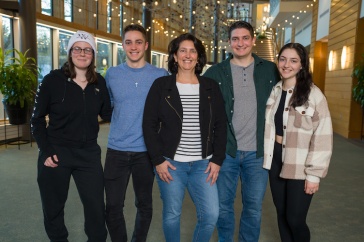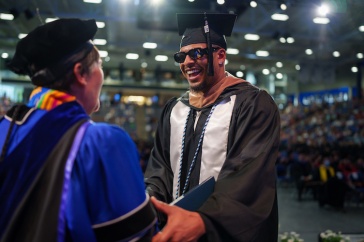Allison McCully’s colleagues don’t invite her to meetings or greet her with a steaming cup of coffee. Instead, they might whinny or stomp their feet to welcome McCully, who is barn manager and an instructor at UpReach Therapeutic Equestrian Center in Goffstown, N.H., to her work day.
“The whinnying means ‘feed me,’” McCully says. And that’s the first thing she does each day — gives 13 horses their breakfast and lets them outside to stretch their legs. After all, they have a busy day ahead of them. Some will ride with UpReach clients, others will exercise with UpReach staff. All must stay trained and in shape for their work at the center, which sees hundreds of riders each year.
All UpReach clients have a diagnosed disability. They come to the center to learn how to ride and through doing so gain the physical strength and confidence to help them live with those disabilities. A certified therapeutic riding instructor, McCully began volunteering at UpReach in high school. She loved the work, but when it came time for college, studying therapeutic riding never even crossed her mind — that is, at least, until the day two semesters into her nursing degree at a different college when she found herself face-to-face with a fetal pig to dissect.
“I wanted nothing to do with it,” McCully says. “That really sealed the deal on my future as
 |
| This is the first profile in the 10 Under 30 series. See more in this series. |
a nurse.”
The realization prompted her to reevaluate her plans, and that’s when she discovered the therapeutic riding program at UNH. “It seemed way more up my alley,” McCully says. She transferred and spent the next two years in the equine studies bachelor’s degree program at the College of Life Sciences and Agriculture.
Penchant for Ponies
UNH therapeutic riding program director Cindy Burke ’90, ’02G remembers McCully well. “Allison’s passion coming into the program really stood out,” she says. “She came in knowing specifically where she wanted to work, and she had extraordinary energy with the children in our program.”
 |
| Allison McCully works with a client at Upreach Therapeutic Equestrian Center in Goffstown, N.H. |
In addition to completing the equine studies degree requirements, every student in the UNH program graduates with a certification to teach therapeutic riding — a commitment that involves two exams, a workshop, a riding test, an internship, 25 hours of teaching under a certified instructor, two letters of recommendation and certifications in first aid and CPR. UNH’s program is one of only five higher-education institutions in the United States — and the only in the northeast — to have a Level 3 accreditation from the Professional Association of Therapeutic Horsemanship International, or PATH, and students graduate both job-ready and in-demand.
“We’re pretty sought after,” says Burke. “We get calls from centers all over the country that are looking for graduates.”
McCully’s part-time role at UpReach turned into the full-time position she holds today not long after she graduated magna cum laude. Curiously, despite her squeamishness over certain nursing school assignments, she has had no trouble managing some of the more hands-on tasks she now performs routinely on her equine friends. While others might consider giving shots and draining abscesses to be gross, McCully says, “It’s all in a day’s work.”
Watch video of Allison at work at Upreach
|
Horses for HealingPeople have for centuries used horses for healing, and modern hippotherapy programs have helped rehabilitate wounded World War I soldiers, victims of paralysis and others in need of physical and occupational therapy. UNH’s own equine-assisted therapies program started in 1989, at first focusing exclusively on helping occupational therapy clients. Over the years, it has evolved into today’s therapeutic riding program, where clients presenting a wider range of physical, emotional and cognitive disabilities, from mild autism to severe mobility issues, come to learn how to walk, trot and canter and meet their personal rehabilitation goals. The center serves about 100 clients from the local and regional community annually. UNH students in the therapeutic riding specialty help teach in the ring under the guidance of program director Cindy Burke and other faculty, fulfilling some of the 25 hours of practice required for their instructor certification. The program also utilizes trained volunteers, including students from other UNH departments who fulfill service-learning hours at the center. “We have recreation management students, occupational therapy students, psychology interns, sociology students — we’ve even had business students do some technical writing projects here,” says Burke. As more published research validates the benefits of therapeutic riding, and as more professionals make client referrals, therapeutic riding centers continue to pop up worldwide, Burke says, creating “a pretty strong job market” for graduates. She tells her students that while they are not the highest-paying jobs, there are some unique fringe benefits — such as having access to horses to ride.
|
Interested in volunteering? The UNH Therapeutic Riding Program will host a volunteer training session on March 10.
Find out more:
UNH Therapeutic Riding Program
UNH College of Life Sciences and Agriculture
UNH Department of Equine Studies
-
Written By:
Tracey Bentley | Communications and Public Affairs




















































